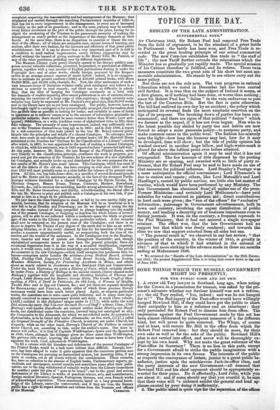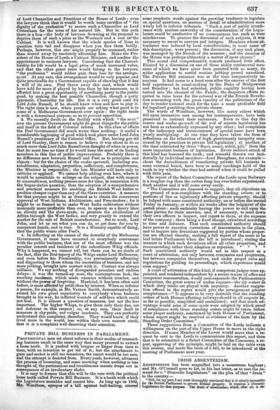SOME THINGS WHICH THE RUSSELL GOVERNMENT MIGHT DO PRESENTLY,
FOR THE PUBLIC GOOD AND ITS OWN.
1. A STIFF old Tory lawyer in Scotland, long ago, when acting for the Crown in a prosecution for treason, was asked by the pri- soner's advocate whether our Saviour himself was not a reform- er ; the old Tory replied, " Yes, indeed ; and was he not hanged for it? " The Red-tapery of the Post-office would have willingly hanged Rowland Hill, if they could have got the public to share their antipathy to him as a reformer and an interloper : they only persuaded Sir Robert Peel to dismiss him •from office. The impression against the Peel Government made by this act has been almost obliterated by subsequent measures of a far different kind, but will never be quite removed. The Whigs, of course and at least, will restore Mr. Hill to the office from which Sir Robert Peel removed him : but they should do more, for their own sake as well as for the sake of the public. Rowland Hill's plan is not carried into effect, and never will be thoroughly ex- cept by his own hand. Why not make the great reformer of the Post-office its Secretary? There is no lion in this path, except for a Government afraid to strike the public imagination with a strong impression in its own favour. The interests of the public as respects the conveyance of letters, justice to a great public be- nefactor, justice upon the mischievous Jack-in-office class, and the party interests of the new Government—all demand that Rowland Hill and his chief opponent should be appropriately re- warded for their pains. Do it effectually, Lord John, while you are about it : and if some should say that you overdid it, be sure that their voice will 143 unheard amidst the general and loud ap- plause excited by your doing it sufficiently.
2. The public mind is quite ripe for the separation of the offices
of Lord Chancellor and President of the House of Lords : even the lawyers think that it would be worth some sacrifice of " the dignity of the profession" to secure such a Chancellor as Lord Cottenham for the term of his natural life. But in this path there is a lion—the body of lawyers frowning at the proposal to deprive them of such a prize as the Woolsack and a seat inethe Cabinet. It is well known that the whole species of lions in question turn tail and disappear when you face them boldly. Perhaps, however, this one might properly be crammed, rather than scared away by resolutely affronting him. Make the Pre- sident of the House of Lords a Cabinet Minister, and confine the appointment to eminent lawyers. Considering that the Chancel- lorship for life would be a legal prize of much increased value, and that the other great prize would belong to the lawyers, "the profession" would rather gain than lose by the arrange- ipsot. At any rate, this arrangement would be very popular, and quite practicable for a Government capable of showing that it has a will of its own. Peel threw away this card, which would have told for more if played by him than by his successor, as it afforded him a great opportunity of sacrificing party to the public good, by making the best possible Chancellor, though a party opponent, Chancellor for life. But it is a very good card for Lord John Russell, if he should know when and how to play it. The right time is now, when people are asking what good is to come of a Melbourne Government over again : the right mode is with a determined purpose, so as to prevent opposition. 8. We recently dwelt on the facility with which " the next " now the present Government might do great things for the public and itself in the field of Colonial reform, In this class of affairs the Peel Government did much worse than nothing : it undid a considerable beginning of good which took place under Lord John Russell's presidency of the Colonial Office. But, having got rid of Lord Stanley, there is reason to believe it was about to do so much more than Lord John Russellever thought of when in power, that he must lose no time if he would keep the start of its leading members in this line of public improvement. Probably there is no difference now between Russell and Peel as to principles and objects : but for the choice of the modus operandi, including sea- sonableness, adaptation, proportion, sufficiency, and completeness, the Minister is responsible ; the late Minister will have only to criticise or applaud. We cannot help adding even here, where it would be unsuitable to enlarge on the subject, that with respect to seasonableness, nothing presses more for time, in connexion with the Sugar-duties question, than the adoption of a comprehensive and practical measure for enabling the British West Indies to produce cheaper sugar than any of the Slave countries. A measure for that purpose might be ao framed as to obtain the concurrent approval of West Indians, Abolitionists, and Free-traders ; for it might be so framed as to make West India cultivation without monopoly more profitable than ever, to operate as a heavy blow on slavery and the slave-trade, to promote the civilization of Africa through the West Indies, and very greatly to extend the market for the sale of British manufactures. Set to work, Lord John, and let us see what you can do, or get done for you by competent hands, and in time. It is a iinistry capable of doing, that the public wants after Peel's. 4. In reflecting on the causes of the downfal of the Melbourne Government, it must have occurred to everybody conversant with the public business, that one of the most efficient was the peculiar conceit and insolence of the subordinate Whig officials. Why it happened, we cannot tell, but there can be no doubt of the fact, that the Red-tapery of the Whigs under Lord Melbourne, and even before his Premiership, was preeminently affronting and disgusting to those whom the necessities of business, and not mere jobbing, brought into contact with it. Contact was always collision. We say nothing of disregarded promises and endless delays : it was the turned-up nose, the contemptuous look, the snorting insolence, which made enemies without number, and without the power of forgiving. Mankind, it has been often said before, is more affected by pride than by interest. When so inferior a person, for example, as Mr. Vernon Smith, demonstratively as- sumed his own great superiority to everybody whom business brought in his way, he inflicted wounds of self-love which could not heal. It is almost a question of manners, but not the less important. The higher Whigs, to give them only their due, are not deficient in this respect ; or, at any rate, their fault in manners is shy pride, not vulgar insolence. They can perfectly understand this complaint, therefore. They would know, if they lived more in the world, less within their own narrow circle, that it is a complaint well deserving their attention.



























 Previous page
Previous page